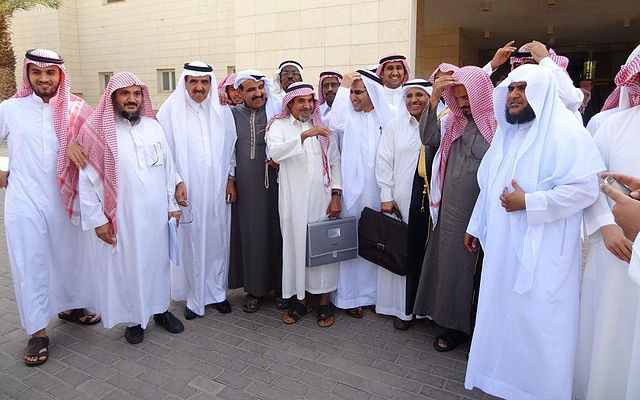On 25 May 2018, Saudi authorities arrested prominent human rights defender Mohammed al-Bajadi. He was arrested along with almost a dozen women rights defenders because of his activism and human rights work. While a number of the women who were arrested have been released, al-Bajadi remains in detention.
Mohammed al-Bajadi is a businessman and a founding member of the human rights organization, the Saudi Civil and Political Rights Association (ACPRA), which was established in October 2009 by 15 activists, 11 of whom signed the founding document. ACPRA documented human rights violations in Saudi Arabia and “articulated a broad vision for civil and constitutional reform.” Due to its human rights and political reform work, the government refused to grant it a license to operate legally, thereby placing the organization and its members at risk of detention and imprisonment.
Because of his work with ACPRA and calls to end torture and arbitrary detention, authorities arrested al-Bajadi in March 2011, beginning a larger crackdown on the organization and its members. On 12 April 2012, Saudi Arabia’s counter-terror court system, the Specialized Criminal Court (SCC), sentenced him to four years in prison on charges stemming from his work with ACPRA. Among the charges are participating in the “establishment of an unlicensed organization, harming the image of the state through the media, calling on the families of political detainees to protest and hold sit-ins, contesting the independence of the judiciary, and having banned books in his possession. While he was released from prison in November 2015, he was transferred to the Mohammed bin Nayef Center for Counseling and Care, an extremist rehabilitation center, despite his record of non-violent, pro-democracy activism. On 7 April 2016, authorities released him from the center, although he remains banned from travelling until 2020.
Since al-Bajadi’s arrest in 2011, the Saudi authorities have systematically targeted the free members of ACPRA. As a result, many of the organization’s members are currently in prison. Mohammed al-Qahtani and Abdullah al-Hamid, arrested in June 2012 and sentenced in 2013, remain in prison serving 10 and 11 years respectively. In May 2013, authorities arrested Fowzan al-Harbi and the SCC sentenced him in December 2013 to six years in prison, a term that was later increased to 10 years in prison. A court also convicted and sentenced to prison Omar al-Said and Abdulkareem al-Khoder in 2013. In April 2014, officials arrested Dr. Abdulrahman al-Hamid, and the SCC sentenced him in October 2015 to nine years in prison. In May 2016, the SCC sentenced Abdulaziz al-Shubaily to eight years in prison and in December 2016, officials increased Issa al-Hamid’s prison sentence from nine years to 11 years in prison.
Saudi officials have also targeted associates of the group and lawyers who represented ACPRA members in court. For example, Waleed Abu al-Khair was arrested in October 2013 and sentenced in July 2014 to 15 years in prison and 15-year travel ban. Then, in May 2018, around the same time authorities arrested Mohammed al-Bajadi, officials arrested Dr. Ibrahim al-Mudaimeegh. A human rights lawyer, Dr. al-Mudaimeegh has represented activists including ACPRA members and Waleed Abu al-Khair, Mohammed al-Otaibi, Abdullah al-Attawi, Essam Koshak, and Issa al-Nukheifi.
Mohammed al-Bajadi’s arrest is part of a larger crackdown against women’s rights activists and human rights defenders around Saudi Arabia. It signals that Saudi Arabia not only will not allow human rights activism and criticism of government policies, but that it will continue to suppress civil society organizations and their members. The Government of Saudi Arabia should immediately and unconditionally release all activists and prisoners of conscience. It should also amend its laws to accord with international human rights principles of free expression and opinion and free association and assembly.





